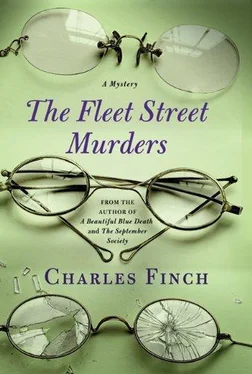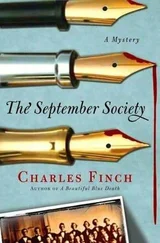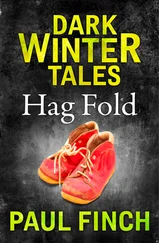Charles Finch - Fleet Street murders
Здесь есть возможность читать онлайн «Charles Finch - Fleet Street murders» весь текст электронной книги совершенно бесплатно (целиком полную версию без сокращений). В некоторых случаях можно слушать аудио, скачать через торрент в формате fb2 и присутствует краткое содержание. Жанр: Исторический детектив, на английском языке. Описание произведения, (предисловие) а так же отзывы посетителей доступны на портале библиотеки ЛибКат.
- Название:Fleet Street murders
- Автор:
- Жанр:
- Год:неизвестен
- ISBN:нет данных
- Рейтинг книги:5 / 5. Голосов: 1
-
Избранное:Добавить в избранное
- Отзывы:
-
Ваша оценка:
- 100
- 1
- 2
- 3
- 4
- 5
Fleet Street murders: краткое содержание, описание и аннотация
Предлагаем к чтению аннотацию, описание, краткое содержание или предисловие (зависит от того, что написал сам автор книги «Fleet Street murders»). Если вы не нашли необходимую информацию о книге — напишите в комментариях, мы постараемся отыскать её.
Fleet Street murders — читать онлайн бесплатно полную книгу (весь текст) целиком
Ниже представлен текст книги, разбитый по страницам. Система сохранения места последней прочитанной страницы, позволяет с удобством читать онлайн бесплатно книгу «Fleet Street murders», без необходимости каждый раз заново искать на чём Вы остановились. Поставьте закладку, и сможете в любой момент перейти на страницу, на которой закончили чтение.
Интервал:
Закладка:
“It’s the brazenest sainted thing I ever heared o’,” said one of the constables, his voice almost tinged with admiration.
“He was the only man in the nation who could have pulled it off,” said Jenkins anxiously. “Before this is all over you have to explain it to me, Charles.”
“Yes,” murmured Lenox. He was less full of chat than the others; he had not thirty minutes before shot a man with whom he had shared port, at whose table he had dined, with whom he had played cards. He hoped passionately that they might catch him, but also that Barnard might still be alive when they did.
Dawn began to glimmer and rise. It came first as a lightening above the horizon, and then the dark pulled back to reveal a pink and purple range of clouds. It was bitterly cold on the water.
Then they came around a bend in the river and saw it, as big as life.
It was a small red barge, which sat low in the water; it had pulled to the left side of the river now, where a sandy embankment threatened to ground it. The barge’s virtue was readily apparent-four small but very heavy-looking crates stood at the edge of the deck, next to a ramp that extended from its side.
There were five men on deck. Barnard was sitting against the cabin’s outer door, directing the others with his left hand, clutching his right to his stomach. The other four men were engaged in stopping the boat and readying the crates to be off-loaded.
It was a good location, lying as it did in the fields between two villages, only two miles east of London’s outer limits; for all Lenox knew, Barnard might have bought these fields. There was a dray cart with two horses before it standing on the bank and a single man in black holding their reins.
“The devil,” said Dallington under his breath.
“I’ll call to him,” said Jenkins.
“No,” Lenox quickly interjected. “He hasn’t seen us yet. Stop poling.”
It was true. Their skiff was floating along the opposite side of the river, and the men on the barge were so absorbed in their work that they hadn’t noticed the only other boat in sight.
“Look,” Dallington offered, “the hammer above that chap’s eyebrow.”
“Indeed,” said Jenkins quietly. “George Barnard and the Hammer Gang. It will make for a tidy arrest.”
Lenox nodded but had a grim feeling it might not be so simple. “Pole along this bank, and then we’ll run over there as quickly as we can, try to catch them by surprise.”
Soon they had done it, and the two constables were rowing as hard as they could where it was too deep to pole the skiff along.
“You have a pistol?” Lenox asked Jenkins.
“Yes, I brought-”
Then a cry went up on the barge. They had seen the skiff, and Barnard, his face both livid and shocked, began to shout at them. Twenty yards off, Lenox heard him yell, “Leave the last crate! Get me off of here!”
This close Lenox saw the hammer tattooed above the eyes of the men on the barge, and very fleetingly he thought of Smalls and his unfortunate mother.
A bullet cracked him back to attention; it came from Barnard, from the gun he had trained on Lenox at the Mint, and it splintered off a great chunk of the skiff’s hull.
“Get down!” cried Jenkins.
Lenox reached over and pulled on Dallington’s arm-the young man had been standing agog, staring at the barge-and shouted, “Leave off the rowing! Fire back!”
Another bullet flew by them, this time whistling over their heads. A third took out part of the skiff’s starboard side, crackling and singeing the wood there. All of these came from Barnard. Jenkins fired back, but the bullet skittered harmlessly over the river.
“We’re taking on water,” said one of the constables.
“Hold on,” said Lenox. “We can make it to the bank. Try to pull us under the barge, where they can’t shoot at us.”
“Look!” said Dallington softly.
A fourth bullet hit the boat, only narrowly missing one of the constables, but then Barnard turned to stare at what the men on the skiff were looking at.
The four Hammers were in utter disarray. One of them was fleeing west, back toward London, sprinting as fast as he could. One was trying to lug Barnard off the boat to where the three crates rested (the fourth still stood on the deck of the barge). But it was the other two who were of the most interest. One of them had punched the driver of the dray in the face, and the two men were loading one of the crates onto the cart.
“Stop!” shouted Jenkins.
“Stop!” shouted Barnard almost simultaneously.
These were both excellent pieces of advice, no doubt, but they went unheeded. One of the two men was in the back of the cart, lovingly bracing the crates of white notes against the bumps to come in the road, while the other was furiously whipping the aged, stultified horses, who hadn’t been especially perturbed by the gunshots and were only now drafted into motion by the blows on their flanks.
Soon the fourth Hammer, the one who had been helping Barnard, gave that up as a bad job. The third crate had cracked and split upon hitting the bank, and he ran to it and stuffed great thick chunks of money into his pockets and then ran off westward, too.
“Get them!” said Jenkins to the constables. The skiff was pulling up alongside the barge.
The two constables waded into the shallow water and started to run after the criminals. Barnard, meanwhile, had staggered off the boat and was filling his own pockets with money. He started to run east, but Dallington, spry and youthful, caught him almost instantly, tackling him to the ground, and a moment later Lenox and Jenkins had joined him.
Barnard was bleeding profusely, sweat upon his brow, and the impotent gun was still clutched in his hand.
“You’re under arrest,” said Jenkins.
Suddenly everything seemed very quiet. The dray had turned behind a distant row of barns and gone out of sight. Lenox looked up and around him: the barge floating gently at the bankside; the skiff splintered and slowly sinking; the brilliant gold glimmer of light just coming up over the deep green fields and the gray, glossy water. It was beautiful.
“Lenox, you bastard,” said Barnard and fainted.
CHAPTER FORTY-SEVEN
Why did he have Smalls killed?” asked Dallington.
He, Jenkins, Graham, and Lenox were sitting in Lenox’s library, gulping cup after cup of hot tea with milk and chewing on sweet rolls. It was much later, just past ten in the morning. For the past several hours the wheels of justice had unhurriedly cranked. The two men who had fled on foot were soon run down by the two constables from the skiff, and George Barnard was receiving medical attention as the entire police force buzzed about his identity and potential crimes. Still missing, on the other hand, were the pair of Hammers who had escaped in the dray cart. They had dropped one box of notes by the side of the road but still bore with them thousands of pounds. All across Britain and the Continent police forces were looking for them.
“Panic and caution,” Lenox answered. “Exeter was releasing all of those cryptic, confident statements to the press, and Barnard must have felt the stakes were too high for much to depend on an untested man with uncertain allegiances, who had probably only killed Simon Pierce to clear his mother’s debt.”
“Perhaps to enter the Hammer Gang as well,” Dallington added.
“Exeter,” murmured Jenkins thoughtfully, his coffee cup paused just before he was going to sip it.
The three men pondered their late colleague together; going through all their minds, no doubt, even Graham’s, was some amalgam of pity, sorrow, and reminiscence. He hadn’t been a perfect man, but he had been at heart a decent one, in over his head.
Читать дальшеИнтервал:
Закладка:
Похожие книги на «Fleet Street murders»
Представляем Вашему вниманию похожие книги на «Fleet Street murders» списком для выбора. Мы отобрали схожую по названию и смыслу литературу в надежде предоставить читателям больше вариантов отыскать новые, интересные, ещё непрочитанные произведения.
Обсуждение, отзывы о книге «Fleet Street murders» и просто собственные мнения читателей. Оставьте ваши комментарии, напишите, что Вы думаете о произведении, его смысле или главных героях. Укажите что конкретно понравилось, а что нет, и почему Вы так считаете.












